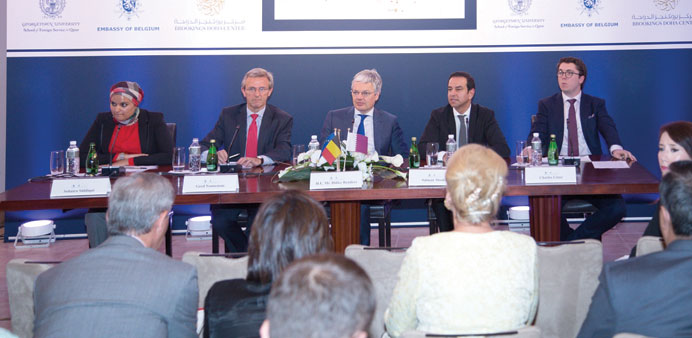Georgetown University School of Foreign Service in Qatar (GU-Q), together with the Brookings Institution’s Doha Centre and in association with the embassy of Belgium in Qatar, recently held a panel presentation titled “ISIS: Ideology, Support, Impact, Response”.
The speakers addressed the dynamics, drivers and economics of the militant group, its ideological underpinnings and the wider political context. They also reviewed the short, medium, long-term outlook and the potential ways of addressing the crisis.
The panel was moderated by the dean of GU-Q, Dr Gerd Nonneman, and included leading experts from both institutions as well as Didier Reynders, Deputy Prime Minister and Minister of Foreign Affairs of Belgium.
“Georgetown and Brookings both have extensive expertise related to this subject and share a long history of collaboration, both on the main campus in Washington DC and here in Doha. We don’t just attend the same events and work together on a number of projects: GU-Q and the Brookings Institution’s Doha Centre also have a formal MoU governing internship opportunities for our students of international affairs. So, it made a lot of sense to co-organise this panel together on a subject of such current importance,” said the dean.
The speakers acknowledged the growing sense of urgency to contain the violence, but also focused on the need for a political solution and a comprehensive approach that considered the local, national, regional and international contexts.
Belgian Foreign Minister Reynders said: “The sense of urgency triggered our decision to engage militarily to contain ISIS. However, we are fully aware of the need to tackle the situation politically and in a comprehensive manner, including by looking at the context in which it has been able to prosper.”
He also underlined a common responsibility to “contribute to the fight against organisations like ISIS”.
“We have a responsibility as leaders in the way we will react to the terrorist threat in respecting fully the rights of all our citizens and, in general, to create the conditions for an inclusive development of our societies. We all have a responsibility as citizens to promote mutual understanding and trust in our societies. Finally, we all have to take a responsibility – as human beings – to contribute to our societies constructively, in that spirit of inclusiveness.”
Belgian ambassador Christophe Payot extended his thanks to both GU-Q and Brookings Doha for their support in organising the conference, saying: “By bringing together such top experts, they contribute to the international community’s efforts to face this common threat in a better informed and more united way.”
Other contributors included Salman Shaikh, director of Brookings Doha, Charles Lister, visiting fellow at Brookings Doha, as well as from GU-Q, Prof Sohaira Siddiqui, Prof Abdullah al-Arian and Prof Anatol Lieven.

Speakers at the panel presentation
